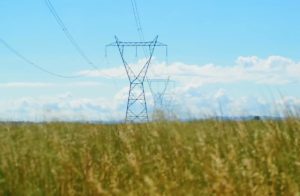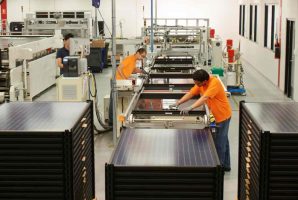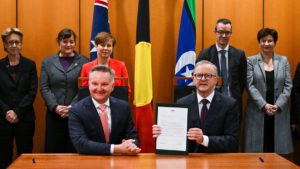Barring the unlikely emergence of a last-minute challenge, Anthony Albanese look certain to be elevate to leader of the Federal Labor Party early next week, and a quick re-branding of the party’s climate and energy policy seems a certainty.
Labor went to the last election with a carefully thought out package of policies that seemed ambitious in the current political debate but would likely have been easily met, given the progress and cost reductions of key technologies. But it couldn’t sell it, and nor could it shoot down the Coalition scare campaign.
The pitch to voters was largely focused on how taking action will benefit the environment, how action will help to preserve significant sites like the Great Barrier Reef and avoid the impacts of a changing climate that include increased risks of flooding, drought and sea-level rise.
Labor may now look to shift to adopt a new approach that more closely links climate action with the economy, including looking overseas for new ways to engage with voters and sell them on the benefits that investments in clean energy and greater support for sectors in transition will have for workers.
Shadow environment minister Tony Burke has made his desires known, already calling for the Labor party to adopt the ‘Green New Deal’ approach that has been developed by some leading US Democrats.
The Green New Deal package covers a range of progressive economic reforms, and seeks to make direct links between improving the fairness of the economic system, while supporting investments in new clean energy industries and taking action on climate change.
The package developed by US Democrats includes commitments to reaching 100% renewable energy by 2030, the introduction of a carbon tax and the elimination of greenhouse gas emissions, along with guaranteed employment, affordable healthcare and sustainable wages.
An adoption of such a policy package in Australia, would help address the misconception that action on climate change and a transition away from coal is ultimately a trade-off with new jobs, the fear that the Liberal-National Coalition tapped into in Queensland.
In calling for a new approach to promoting Labor’s policies Burke lamented Labor’s early failures to legislate an emissions trading scheme under the Rudd Government, while stressing that Labor would not move away from developing climate policies and setting emissions targets informed by science.
“For twelve years now, the different mechanisms we’ve put forward, the Australian people or the parliament, have ultimately said no to. As a result of that, Australia is in a worse position than we would’ve been if we had got our original policy through 12 years ago”. Bourke told ABC RN.
“When we work through the policy review, that we are reviewing policies, not reviewing values.”
“The Government has dared us to say that our ‘targets were too high, that’s what we should abandon’. The principle that we determine targets based on what the science says, [is one] we must not shift from.”
Greens climate change spokesperson Adam Bandt said that the Greens would support an approach that reflected the Green New Deal package that has been developed by United States Democrats, and would be open to working with Labor to develop and implement such a package, but was worried by how quickly Labor seems to be moving to support the Adani Carmichael coal mine, and a potential shift towards adopting the Coalition’s Direct Action Policy.
“What worries me is that Labor is taking all the wrong lessons from the Federal Election. There’s this myth that’s being spun by LNP members after the election that somehow there’s this big pro Adani, pro coal message coming out of the election, and I think that’s just not right.” Bandt said.
“I’m very worried that Tony Burke is clearing the way for Anthony Albanese to crab walk away from climate action. When it comes to talking about direct action and something other than a market mechanism, there’s two kind of things you could be talking about.
“On one hand, you could be talking about the Green New Deal approach… if that is what they are talking about, that gets a tick from us, we’d be quite happy to work on something like that”.
“But on the other hand, there is the Tony Abbott approach to Direct Action… if that’s the way Labor is going, that is a capitulation to Tony Abbott, you don’t fight Tories by becoming them, you don’t end the climate wars by surrendering”.
Labor has adopted targets for renewable energy, electric vehicles and emissions reductions that have worked to differentiate its offering from those of the Coalition.
Before the election, Labor’s targets were rated as just meeting the mark with regards to meeting the aims of the Paris Agreement to limit global warming to as low as 1.5 degrees above pre-industrial levels.
However, forecasts for growth in renewable energy use, and numerous reports that put the cost of wind and solar, plus storage and other firming technologies – at below the cost of even existing coal plants, make the economic case overwhelming and clear the path for a more rapid uptake, as long as the government has a plan and does not erect barriers.
Analysis of the electric vehicle market also show that, provided there is a stable policy environment, Australia would largely on track to meet Labor’s targets with minimal new market intervention. But again, it needs a plan to make sure that the infrastructure is in place.
The Coalition attempted to run a ridiculous scare campaign based on Labor’s target for half of all new car sales to be electric vehicles by 2030, claiming that Labor was “coming after your ute” and seeking to spook blue-collar tradies from supporting the Labor party.
However, Labor’s target is not significantly out of step with Bloomberg New Energy Finance predictions that electric vehicle sales would overtake those of petrol and diesel vehicles by the mid 2030s, with the EV market capturing a 61% market share in Australia by 2040.
Such a boom in electric vehicle sales will flow through to create opportunities in Australia’s resources sector. Under the new leadership of Albanese, Labor will need to find a way to make this connection when selling its platform to voters.










